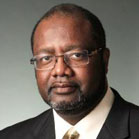
PROGRAM: Keynote Speakers Streaming videos of the Keynote Addresses and Panel Sessions are now available for on-line viewing: CLICK HERE.
Ray Anderson has been called a "born-again environmentalist". He is an industrial engineer by training and is the founder, chairman, and chief operating officer of Interface, Inc., the largest commercial carpet manufacturer in the world. Anderson relates that he had never really been concerned about the environment or sustainability until he read Paul Hawken's The Ecology of Commerce in 1994 and had what he calls an "ecological epiphany," literally crying while reading the book.
Dr. Geoffrey Chase, who has been the Dean of Undergraduate Studies at San Diego State University since 2002, attended Ohio Wesleyan University, where he received the BA in English in 1971. He also holds an MAT from Miami University (Ohio) and the AM in English from Boston College. After receiving his PhD in American literature from the University of Wisconsin-Madison in 1981, he taught for 11 years in the School of Interdisciplinary Studies at Miami University of Ohio. While at Miami, he served as a Fulbright Scholar in Turku, Finland (1990-1991). Dr. Chase joined Northern Arizona University in 1992 as the Director of English Composition. While at Northern Arizona University, Chase also served as English Department Chair, Dean of Liberal Studies, and as the Associate Provost for Undergraduate Studies. At NAU, he revamped the composition curriculum to give it an environmental focus and became a leader of the Ponderosa Project, a faculty development project aimed at helping faculty from throughout the university integrate issues of environmental sustainability into their courses. The Ponderosa Project has become a model faculty development project that has been introduced to faculty on more than 120 campuses. In 2004 he co-edited, with Peggy Barlett, Sustainability on Campus: Stories and Strategies for Change which was published by MIT Press. He currently serves as Board Chair for the Association for the Advancement of Sustainability in Higher Education (AASHE), and has served on that board since 2005.He has also served on the Executive Committee for the American Conference of Academic Deans (ACAD), as Co-Chair for the Proposal Review Committee for the Western Association of Schools and Colleges (WASC), and has served as team chair for accreditation teams. Dr. Chase lectures widely on sustainability in higher education and, with Peggy Barlett, offers workshops on institutional change, curriculum, and sustainability.
Frances Moore Lappé is a democracy advocate and world food and hunger expert who has authored or co-authored 16 books. She is the co-founder of three organizations, including Food First: The Institute for Food and Development Policy and, more recently, the Small Planet Institute, which she leads with her daughter Anna Lappé. In 1987 she received the Right Livelihood Award (a.k.a, the “Alternative Nobel.”) Her first book, Diet for a Small Planet, has sold three million copies and is considered “the blueprint for eating with a small carbon footprint since long before the term was coined." Her most recent book Getting a Grip: Clarity, Creativity, and Courage in a World Gone Mad, was awarded the Nautilus Gold/“Best in Small Press” award. In June 2008, that book and Diet for a Small Planet were designated as must-reads for the next U.S. president (by Barbara Kingsolver and Michael Pollan, respectively) in The New York Times Sunday Review of Books. Lappé has received 17 honorary doctorates from distinguished institutions including The University of Michigan and was a visiting scholar at the Massachusetts Institute of Technology, 2000-2001. She received the 2008 James Beard Foundation Humanitarian of the Year Award for her lifelong impact on the way people all over the world think about food, nutrition, and agriculture. In 2008, Gourmet Magazine named Lappé among 25 people (including Thomas Jefferson, Upton Sinclair, and Julia Child), whose work has changed the way America eats. The same year, Diet for a Small Planet was selected as one of 75 Books by Women Whose Words Have Changed the World by members of the Women’s National Book Association in observance of its 75th anniversary.
Jerome Ringo is the president of the Apollo Alliance, a coalition of organized labor, environmental, business and civil rights leaders determined to free the United States of dependence on foreign oil. The alliance is trying to educate the public and lobby the Hill about the need to invest in alternative clean-energy sources, energy-efficient technology and jobs. Ringo’s experience organizing environmental and labor communities, and his drive to further diversify the environmental movement, unites many of Apollo’s partners to create a broad based coalition providing real solutions for our energy crisis.
PROGRAM: Panel Sessions
S. Page Cotton is entering his 14th year as the Theodore M. Katula Director of Athletics at DePauw University, where he oversees the University’s 21 men’s and women’s intercollegiate athletic teams, several club and intramural programs and recreational sports generally. During his tenure as director of athletics, DePauw’s athletic program has consistently performed well in the Division III Directors’ Cup standings, finishing 13th in 2005-06, 15th in 2006-07 and 18th in 2007-08. DePauw also has played host to several NCAA regional tournaments as well as national championships in men’s tennis and men’s and women’s indoor track and field. A professor of kinesiology at DePauw, Cotton received DePauw’s Medora C. Adams Distinguished Professor Award in April, 2004. He also served as men’s soccer coach for 39 seasons, compiling a 390-190-33 record. Jeff Orleans (Moderator) is Co-Chair of the National Collegiate Athletic Association’s “Green Team”, which includes both NCAA staff and representatives of the NCAA’s more than 1000 member schools and conferences. The Green Team is charged with bringing greater sustainability to NCAA administrative, championship and other activities and with developing ways to share sustainability best-practices and resources throughout collegiate athletics. Orleans retired on July 1 after 25 years as Executive Director of the Council of Ivy Group Presidents and Commissioner of the Ivy League, the nation’s broadest-based Division I athletic conference. Orleans served on numerous NCAA governance committees and also has been active in the National Association of College and University Attorneys, which named him a “Fellow” in 1999. Steve Simmerman was named Assistant Athletics Director at Purdue in January of 2003 after eight years as Facilities Operations Director. He oversees all Athletic Dept. new construction, remodeling, event management, renovation and maintenance of all the athletics department buildings and grounds. He is currently the Athletic Department Project Manager for the Mackey Arena Renovation and Expansion project at Purdue, the largest single construction project the university has ever undertaken. Simmerman began working for Purdue in 1983 as assistant superintendent of Ross-Ade Stadium. He was promoted to superintendent in 1989.
Francis Janes is a Vice President at ShoreBank Pacific’s Seattle Office. Prior to his career in banking, Francis was the Chef/Owner of Café Ambrosia - an organic, vegetarian restaurant in Seattle. Francis has also worked in the Information Technology industry in positions ranging from Systems Consultant to Marketing Manager. Francis is a member of the Cascadia Region Green Building Council and a board member of Pigs Peace Sanctuary and iLEAP – The Center for Critical Service. He volunteers for organizations that include Food Lifeline, YMCA, Habitat for Humanity and Washington Community Alliance For Self Help (CASH). He has served as Chair of the Board of EarthSave International and as an Area Governor for ToastMasters International. |
| PARTNERS |
| SPONSORS |
| GOLD |
| SILVER |
| BRONZE |
| CARBON OFFSET SPONSOR |
| MEDIA SPONSORS |
| CONTRIBUTING SPONSORS |
![]()
Contact Web Manager at: ceres@bsu.edu












